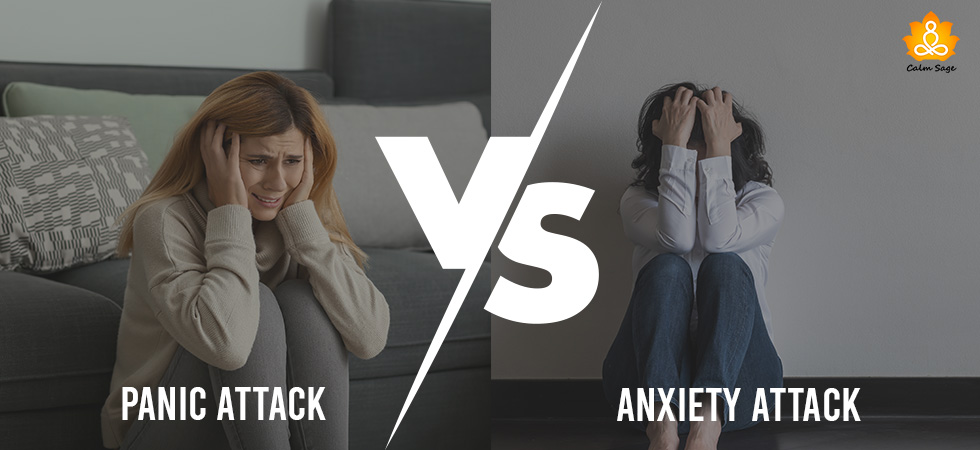Panic Attack vs Anxiety Attack: Know The Difference

‘Panic attack’ and ‘anxiety attack’ are two terms that often leave people confused due to similarity in symptoms. Despite the shared symptoms between the two, there is a considerable difference between panic attacks and anxiety attacks.
In a nutshell, Panic attack is a sudden rise of fear, intense discomfort and leads to multiple physical symptoms including trembling and chest pain. Whereas anxiety attacks are backed up by long term anxiety and are wired in the human body from a long time.
The major difference between anxiety and panic attack is found on the basis of intensity of symptoms and length of time of their occurrence.
Clinical Differences: Panic Attack vs Anxiety Attack
Although anxiety attack is not a clinical term, medical professionals base the definition from the book, ‘Diagnostic and Statistical Manual of Mental Disorders (5th edition)’. This book provides an insight about anxiety attack without actually defining the term either.
It says that ‘anxiety’ is a core feature of various illnesses that comes under heading like anxiety disorder, obsessive-compulsive disorder, and trauma stressor-related disorder.
Explaining Panic Attack & Anxiety Attack
Let us now understand the difference between two terms one by one.
1. Panic Attack
When you are in a situation of sudden discomfort or terror due to a change in surroundings and it is accompanied by various other physical symptoms, it is called a panic attack.
Panic Attack Symptoms Include:
- The feeling of being unrealistic
- Detaching from oneself or depersonalization
- Losing control on oneself
- The constant fear of dying
- Pounding heart and chest pain
- Body shaking and trembling
- A sudden feeling of being choked
- Sweating
- Dizziness and lightheadedness
- Body chills or hot flashes
Panic attacks do not occur due to any old or underlying condition but come up due to immediate triggers. Sometimes, even a phobia can lead to panic attacks for which a person may be already prepared. For example, bungee jumping may lead to panic attacks for someone having fear of height.
The symptoms of panic attack may arise within a few minutes and may even subside down soon. This feeling could be so overpowering for some of us that we need to rush to the hospital or call emergency service numbers instantly.
2. Anxiety Attack
The intense episodes of anxiety could be termed as anxiety attacks but they are backed up by common anxiety disorders from the past. It is important to know that anxiety attacks are not as severe as panic attacks. Anxiety attacks may last from a few minutes to few hours or even a few weeks.
Anxiety Attack Symptoms:
- Getting easily tired or feeling fatigued
- Restlessness
- Getting easily tired or feeling fatigued
- Irritability
- Sleeping difficulties
- Muscle tension
- Increased heart rate
- Difficulties in concentration
For the evaluation of anxiety attacks, the doctor asks for your medical history, runs a few physical examinations, and may even recommend going for lab tests. A counseling session may also be accompanied by tests to figure out symptoms, intensity, duration of anxiety, and its impact on your daily lifestyle.
Common Triggers For Anxiety Attack & Panic Attack
We have understood the difference or terms of panic attack vs anxiety attack but there could be some common causes which either generate the anxiety from a long time or build the stress altogether at once. These triggers are:
- Stressful conditions at the workplace
- Social panic
- Phobias like claustrophobia or agoraphobia
- Chronic illness prolonging from a long time
- Withdrawal from drugs and alcohol
- Certain medications and supplements
How To Deal With Onset Of Panic Attack & Anxiety Attack?
As we know that panic attacks show up due to sudden triggers, some personal practices help a person to maintain their state of calm despite unfavorable circumstances.
Similarly, anxiety attacks could also be avoided if you are already aware of the negative causes you are facing and preparing for it in advance.
1. Lifestyle Remedies
Breathing exercises: Focus your attention on breathing whenever you are stressed. A number of breathing techniques can make you grounded and bring you back in reality to find what is wrong and what’s not.
Mindfulness: Mindfulness is a powerful way to stay in the present moment, observe the body and mind and understand your thoughts before actually reacting to them.
Accepting the facts: A sudden instant doesn’t let us accept the present and we get frightened very easily. You need to remind yourself that the situation is tough in the moment but it will pass very soon. So bear with it in the moment.
2. Professional Help
Consulting a psychologist or counselor to learn coping skills is the best idea, especially when you are not able to manage anxiety or panic issues through home remedies. For the same, all you need to do is send us an email at info@calmsage.com and connect with a counselor today.
Wrap-Up
We believe that the concept and connection of panic attack vs anxiety are clear in your mind. It is necessary to understand the difference between panic and anxiety attacks to undergo the right treatment plan.





















This was very helpful to me. I didnt realize there was a difference in the two.
Most of the user never find any difference between them but after reading this they know what exactly it is.
Your article defines the differences between the two well. In my younger years I suffered several panic attacks. I was so afraid until I finally learned breathing techniques etc, to control them. It has been well over twenty years since I had my last attack.